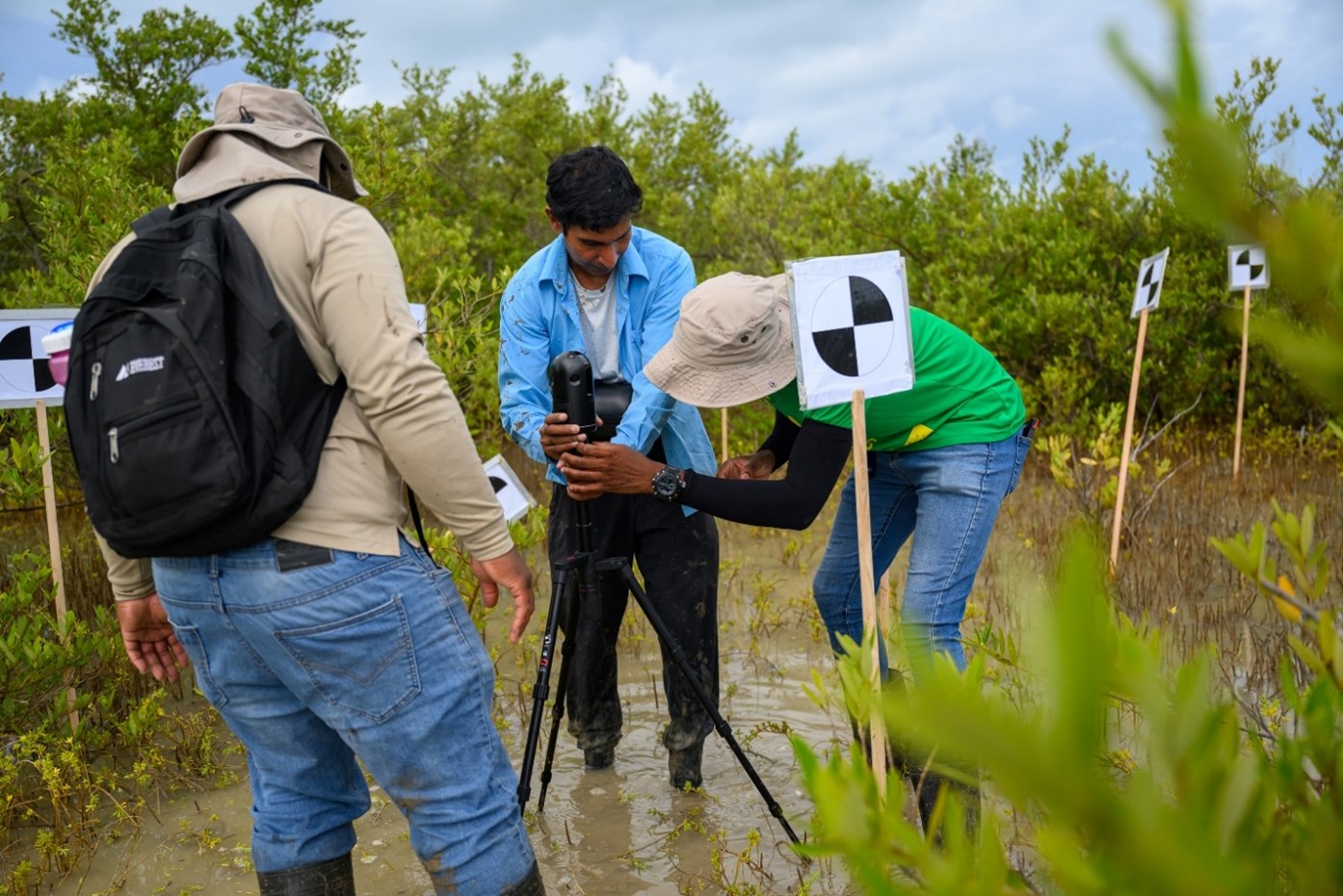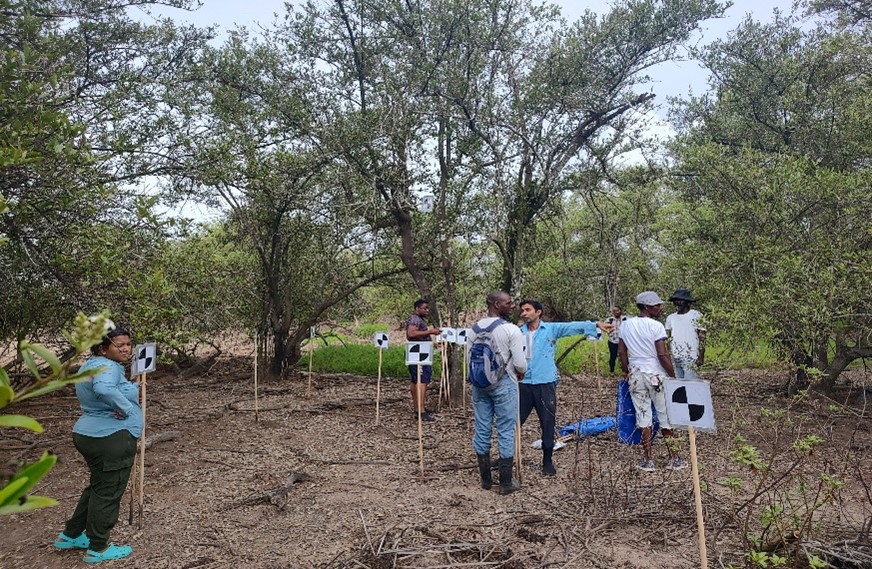News Releases
UWI’s STACIE and the IDB Host Transformative Training Workshop to Enhance Mangrove Ecosystem
For Release Upon Receipt - June 18, 2024
St. Augustine

On the field, Mr. Hamish Asmath, geospatial consultant to the IDB MRV projectpoints out some key unique features of the Jamaican mangroves which introduce nuances in the data collection
ST. AUGUSTINE, Trinidad and Tobago. June 18th 2024 – The University of the West Indies’ (The UWI) St. Augustine Centre for Innovation and Entrepreneurship (STACIE) in partnership with the Inter-American Development Bank (IDB)) recently advanced the capabilities of key environmental stakeholders and beneficiaries in Jamaica by training them in a cutting-edge blue carbon measurement protocol. The workshop is part of an ongoing regional Monitoring, Reporting and Verification (MRV) programme of the United Kingdom (UK) DEFRA Blue Carbon Fund which is administered by the IDB. In 2022, STACIE received technical assistance from the Fund to establish a standardized and regional MRV mechanism for the blue carbon captured in mangrove forests for projects within the Latin America and Caribbean region.
This transformative Terrestrial Laser Scanner (TLS) training workshop was held in Jamaica from June 3 – 7, 2024, and brought together practitioners from government, academia, and non-governmental organizations in Jamaica working on mangrove management, conservation and restoration. This workshop follows a similar training event that took place in Panama in May, 2024.
The training programme began with an opening ceremony which was attended by the officials from the Government of Jamaica including Senator the Hon. Matthew Samuda, in the Ministry of Economic Growth & Job Creation; the UK High Commission in Jamaica - Mr. Kadeem Griffiths-Reid, First Secretary for Access to Climate Finance, the IDB - Mr. Lorenzo Escondeur, Chief of Operations at IDB Jamaica; The UWI - Dr. Graham King, Director of STACIE at The UWI, St. Augustine, Professor Terrence Forrester from The UWI Solutions for Developing Countries (SODECO) and NGOs.
During his opening remarks Senator the Honourable Matthew Samuda, focused on the human impacts of climate change on coastal systems but highlighted Jamaica’s efforts on restoring these systems. This message of the need for restoration was underscored by Mr. Griffiths-Reid, who stressed the profound impact on biodiversity, poverty, and essential resources like food and water. He praised the strong partnership between The UWI and the IDB and emphasized the workshop's role in supporting these restoration efforts.
Nevertheless, the issue of limited capacity, both locally and regionally, for monitoring these ecosystems was raised by the IDB but emphasised the timely nature of the training to fill this gap and to generate essential new information for regional restoration efforts. Dr. King from STACIE underscored the project's importance by highlighting that, “the project laid the foundation for a coherent approach to quantifying and tracking the carbon stored in mangroves, that will be used right around the Caribbean basin.”
 Participants work on data processing of the various species of mangroves in parallel
Participants work on data processing of the various species of mangroves in parallel
The focus of the workshop featured hands-on training led by Mr. Hamish Asmath, geospatial consultant to the IDB MRV project. He provided detailed field and classroom-based training on the TLS method, highlighting the importance of accurate carbon estimates and best practices for using the digital technology. Key unique features of Jamaican mangroves were discussed, including the effect of hurricanes on mangrove community and zonation development and soil surface penetration challenges for adequate mounting of scanners.
Throughout the five-day workshop, participants engaged in scanning, data processing, and practical fieldwork, demonstrating their enthusiasm and readiness to incorporate these learnings into their ongoing efforts. The collaboration between the various natural resources management entities in Jamaica and the region is expected to significantly contribute to the Blue Carbon MRV project.
About The University of the West Indies
The UWI has been and continues to be a pivotal force in every aspect of Caribbean development, residing at the center of all efforts to improve the well-being of people across the region for over 75 years.
From a university college of London in Jamaica with 33 medical students in 1948, The UWI is today an internationally respected, global university with nearly 50,000 students and five campuses: Mona in Jamaica, St. Augustine in Trinidad and Tobago, Cave Hill in Barbados, Five Islands in Antigua and Barbuda and its Global Campus, and global centres in partnership with universities in North America, Latin America, Asia, Africa, and Europe.
The UWI offers over 1000 certificate, diploma, undergraduate and postgraduate degree options in Culture, Creative and Performing Arts, Food and Agriculture, Engineering, Humanities and Education, Law, Medical Sciences, Science and Technology, Social Sciences, and Sport. As the Caribbean’s leading university, it possesses the largest pool of Caribbean intellect and expertise committed to confronting the critical issues of our region and the wider world.
The UWI has been consistently ranked among the best in the world by the most reputable ranking agency, Times Higher Education (THE). Since The UWI’s 2018 debut in THE’s rankings, it has performed well in multiple schemes—among them including World University Rankings, Golden Age University Rankings (between 50 and 80 years old), Latin America Rankings, and the Impact Rankings for its response to the world’s biggest concerns, outlined in the 17 United Nations Sustainable Development Goals (SDGs), including Good Health and Well-being; Gender Equality and Climate Action.
Learn more at www.uwi.edu
Contact
Marketing and Communications Department
- Tel.: (868)-662-2002 ext.2013/2014
- Email: marketing.communications@sta.uwi.edu

